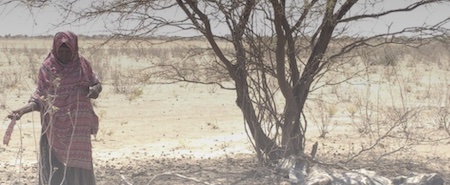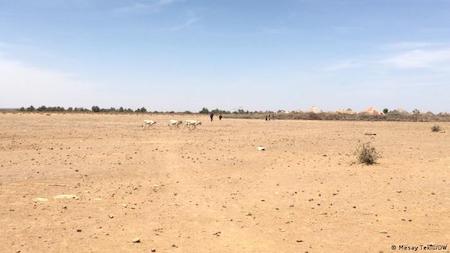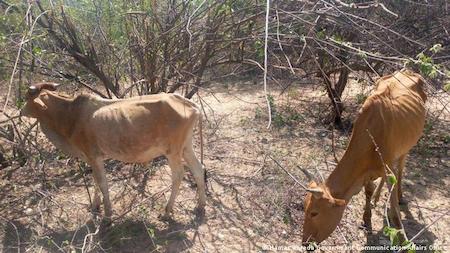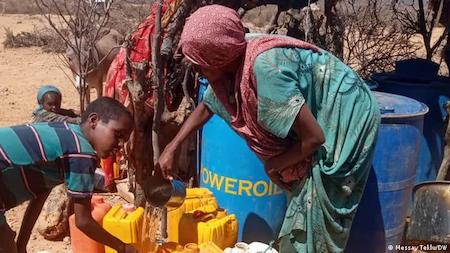Ethiopia grapples with worst drought in 30 years
 Print This Print This
By Staff Writers | 198 Germany News
from 198germanynews.com
Friday, Mar 11, 2022
 |
| GERMANY NIGERIA NEWS |
Lumbering below a cloudless sky and a ruthless noon solar, herds of emaciated camels converge at one of many few wells bearing water in Adawe village in Ethiopia’s south-eastern Somali area.
The water high quality is poor and saturated with salt but the camels — and their house owners — don’t have any selection apart from to drink it.
Adawe usually has 26 wells however as a result of it hasn’t rained right here since April 2021, all besides three of them have dried up.
The Somali area is historically arid. Now although, three subsequent wet seasons have failed.
Not solely is water even tougher to seek out than earlier than, the drought has additionally desiccated the panorama, making the grasses, shrubs and shopping timber that camels and different animals usually feed on scarce.
With little for his or her livestock to eat and drink, the residents of Adawe are compelled to observe their herds shrink, day-by-day.
 |
| Cows in the distance cross a dry plain - there may be little left for animals to eat on the dry, dusty plains |
Dying livestock
The roads listed below are dotted with the carcasses of cows, sheep and goats decaying within the warmth.
Camel herder Abdi Serif mentioned he has already misplaced 30 out of 150 camels — that is a fifth of his herd.
“They’re affected by the drought, in addition to the dearth of pasture. Plus, when the camels do not have sufficient meals, they run away, which makes them vulnerable to being killed by hyenas,” the 25-year-old mentioned.
Abdi usually earns a dwelling promoting his camels on the market. Previously, one camel would convey him round 75,000 birr ($1,480, €1,300). However the costs have plunged to round one fifth of that and consumers are nearly unimaginable to seek out.
“We used to depend on animals for our meals. However now we do not have something to eat as a result of now it is the animals who rely on us,” Abdi advised DW.
 |
| Skinny cows feed under a tree - with little to eat, livestock are nothing greater than pores and skin and bone |
Sheep herder Mahamoud Abdulaye says [that a] large downside is that pastoralists like him don’t have any different method of creating wealth within the arid area.
“On this space, there isn’t any farming, it is a desert. There is not any agriculture,” he mentioned.
He has slight hopes for his remaining flock, Mahamoud mentioned as he lifted a lamb out of a small shelter. With its pores and skin hanging off its bones, the lamb collapsed onto the bottom, too weak to face.
However his livestock aren’t Mahamoud’s most important concern any extra. Now, the daddy of six is praying for his household’s survival.
Familes on the brink
“The state of my youngsters is extraordinarily worrying. They’re anticipating us to assist them however we won’t do something,” he advised DW, explaining [that a] pot of boiled wheat was the household’s every day meal.
Weakened by months of hardship, his youngsters recurrently ask for milk: there’s none, Mahamoud lamented.
The drought circumstances in Ethiopia’s lowland space, which incorporates the Somali and Oromia areas, have led to a 20% improve in circumstances of “extreme acute malnutrition” in youngsters, in response to the UN’s youngsters’s fund, UNICEF.
Total, 6.8 million folks within the drought-impacted space are anticipated to be in want of pressing humanitarian help by mid-March 2022, UNICEF mentioned in a press release.
In a hospital in Gode, a city within the Somali area, docs advised DW that they’ve seen a spike within the numbers of malnourished youngsters admitted within the the previous months.
 |
| Women and children collect water - water has turn into scare within the Somali area |
Little funding
Amongst help businesses, the sense of urgency is rising. However funds are missing to answer the disaster.
UNICEF has requested $31 million to assist drought impacted areas in Ethiopia however has solely obtained about one quarter to this point. The response has been slowed down by different crises within the nation, particularly the Tigray battle within the nation’s north.
The funds would offer money funds to drought-affected households.
“In large villages and cities, meals is offered, the non-public sector is bringing meals,” Ethiopia’s UNICEF consultant Gianfranco Rotigliano advised DW. “The issue is that they can’t purchase it. If we give them a small amount of money, they are going to buy what they want and the youngsters can eat.”
Pressured to depart house
Many households within the affected areas are left with no selection however to depart their villages.
Throughout the Somali area, hundreds have moved north to be nearer to the regional capital, Jijiga, the place the local weather is much less harsh. Pastoralists hope that there they’ll discover meals for his or her animals and save the remnants of their herds.
“The lack of livestock means there shall be pastoralist drop-out, folks fleeing, and they are going to be displaced, with none job alternative,” mentioned Teyeb Sherif Nur, the area’s pure useful resource administration officer for the UN’s Meals and Agriculture Group (FAO).
Most of the displaced have settled in native communities, who typically present shelter and meals. The dwelling circumstances are robust, although, with little entry to sanitation and different fundamental wants.
Ardo Hassen traveled for days with 4 of her youngsters and her remaining 70 animals, lastly organising a makeshift house close to the city of Kebri Beyah, some 50 km south of Jijiga.
Fifteen of her animals died through the journey. Though these which survived can now feed on small patches of dried-out grass, some are very sick.
“I do not know what’s going to occur (…). I’m very involved. Until God offers us rain from the sky, we shall be anticipating authorities help,” she mentioned, as she washed a cooking pot, seated on the earthen flooring of her improvised kitchen.
Source URL
|
 Print This Print This

|

